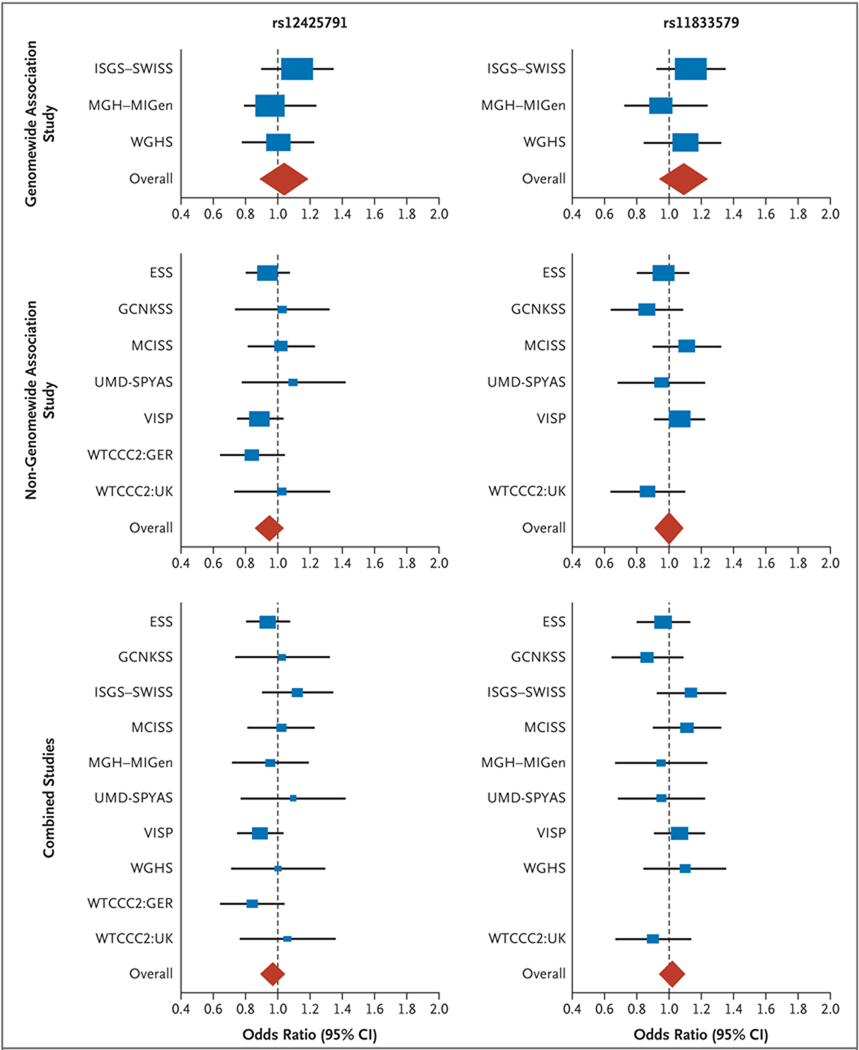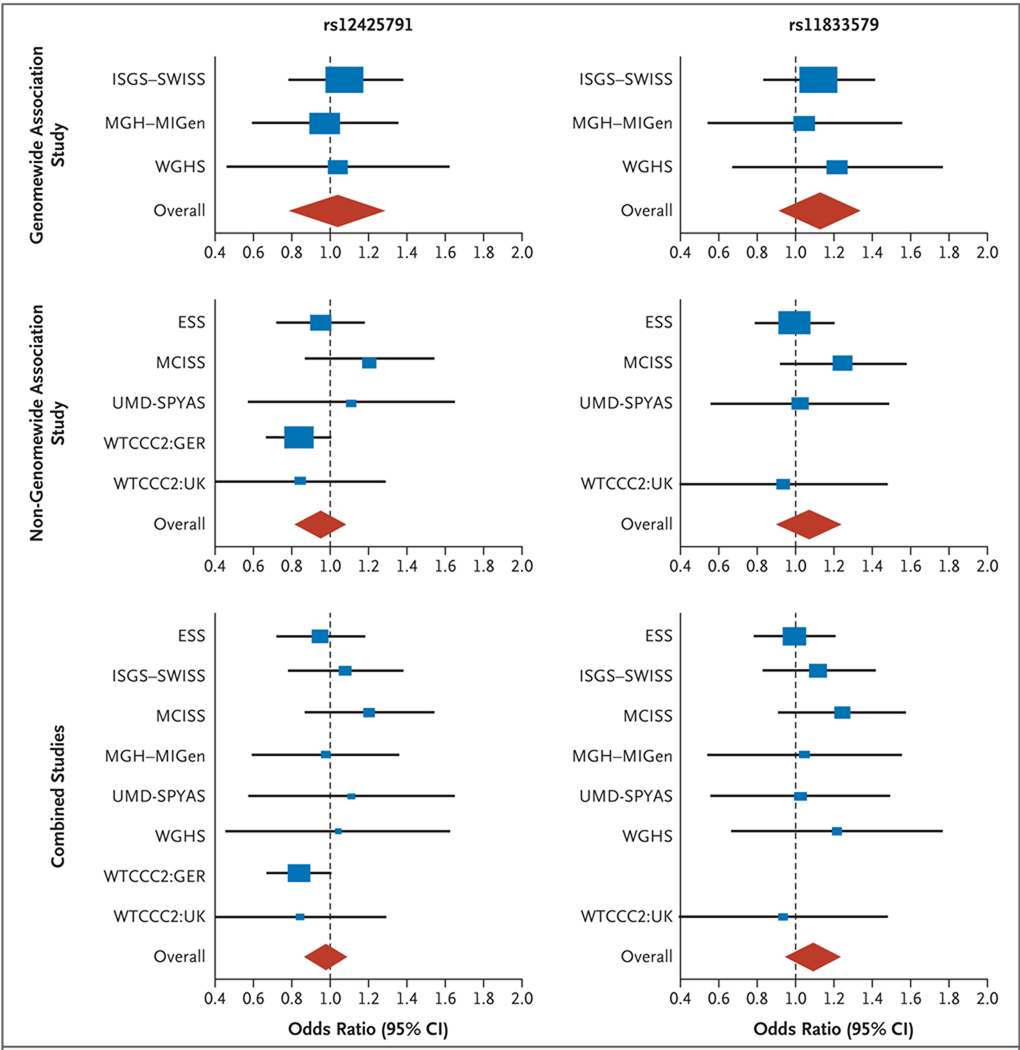TO THE EDITOR: Recently published data from a meta-analysis of genomewide association studies showed that two common single-nucleotide polymorphisms (SNPs) near the NINJ2 and WNK1 genes on chromosome 12p13 were associated with ischemic and, in particular, atherothrombotic strokes.1 To validate these results, we conducted a meta-analysis in a combined sample of 8637 cases and 8733 controls of European ancestry, as well as one population-based genomewide cohort study of 278 ischemic strokes among 22,054 participants.
Both SNPs from the original report (rs12425791 and rs11833579) were tested for association with ischemic stroke, as well as incident stroke, recurrent stroke, and stroke subtypes (according to the Trial of Org 10172 in Acute Stroke Treatment [TOAST] criteria2). We also conducted similar analyses in cases and controls of African-American ancestry and in samples from Chinese and Pakistani subjects. Furthermore, we evaluated gene expression for NINJ2 and WNK1 in 132 cases with ischemic stroke and in 80 controls, as well as the association of the chromosome 12p13 variants with the risk of hemorrhagic stroke. Details regarding the study design and extended results are available in the Supplementary Appendix, available with the full text of this letter at NEJM.org.
We found no association between rs12425791 and ischemic stroke (odds ratio, 0.97; 95% confidence interval [CI], 0.91 to 1.04; P = 0.41) or between rs11833579 and ischemic stroke (odds ratio, 1.02; 95% CI, 0.95 to 1.10; P = 0.55) in persons of European ancestry (Fig. 1). We found no association between either of the SNPs and atherothrombotic stroke in 2235 cases (P>0.10) (Fig. 2) and no association between either of the SNPs and incident ischemic stroke, recurrent ischemic stroke, and ischemic stroke subtypes (P>0.10 for all comparisons). The power to detect an association at an effect size below the lower limit of the 95% confidence interval surrounding the original estimate exceeded 99% for ischemic as well as atherothrombotic stroke. We observed no differences in gene expression between cases and controls and no association between either of the SNPs and a risk of hemorrhagic stroke. Heterogeneity in meta-analyses of our studies was not significant (P>0.20 for heterogeneity, proportion of total variation in study estimates because of heterogeneity in the meta-analysis [I2] <20%),3 although we did identify significant heterogeneity in the original report’s meta-analyses for rs11833579 (P = 0.07 for heterogeneity, I2 = 56.1%) and rs12425791 (P = 0.15 for heterogeneity, I2 = 42.1%).1
Figure 1. Associations between Single-Nucleotide Polymorphisms (SNPs) and Ischemic Strokes in Persons of European Ancestry, According to Study.
The forest plots show the odds ratios for the association between ischemic strokes and the minor allele (A) of both SNPs. No risk effect of these alleles was detected for either SNP. Data from 8915 persons with ischemic strokes are shown. The comparison group is 30,510 stroke-free controls. Individual studies (blue boxes) are plotted against the individual effect sizes (odds ratios). The red diamonds indicate overall odds ratios. The size of the blue boxes indicates study-specific weights for the meta-analysis. Horizontal lines indicate 95% confidence intervals. The dashed vertical line shows the lack of any effect on the risk of stroke (odds ratio, 1.0). ESS denotes Edinburgh Stroke Study, GCNKSS Greater Cincinnati/Northern Kentucky Stroke Study, ISGS Ischemic Stroke Genetics Study, MCISS Middlesex County Ischemic Stroke Study, MGH Massachusetts General Hospital, MIGen Myocardial Infarction Genetics Consortium, SWISS Siblings with Ischemic Stroke Study, UMD-SPYAS University of Maryland Stroke Prevention in the Young Study, VISP Vitamin Intervention for Stroke Prevention Trial, WGHS Women’s Genome Health Study, WTCCC2:GER Wellcome Trust Case–Control Consortium 2, German data, and WTCCC2:UK Wellcome Trust Case–Control Consortium 2, United Kingdom data.
Figure 2. Associations between Single-Nucleotide Polymorphisms (SNPs) and Atherothrombotic Strokes in Persons of European Ancestry, According to Study.
The forest plots show the odds ratios for the association between atherothrombotic strokes and the minor allele (A) of both SNPs. No risk effect of these alleles was detected for either SNP. Data from 2235 persons with atherothrombotic strokes are shown. The comparison group is 30,510 stroke-free controls. Individual studies (blue boxes) are plotted against the individual effect sizes (odds ratios). The red diamonds indicate overall odds ratios. The size of the blue boxes indicates study-specific weights for the meta-analysis. Horizontal lines indicate 95% confidence intervals. The dashed vertical line shows the lack of any effect on the risk of stroke (odds ratio, 1.0).
Our well-powered meta-analyses did not validate previously reported associations between two SNPs (rs12425791 and rs11833579) and stroke.1 This lack of validation is most likely because of a false positive result in the previous meta-analysis. Differences between our predominantly case–control sample and the cohort sample of the original study may also have been factors. Given the power of our meta-analysis, a false negative finding is unlikely. Our results strongly suggest that these SNPs do not confer a substantial, generalizable risk for ischemic stroke.
Supplementary Material
Footnotes
Individual investigators are listed in the Supplementary Appendix.
Representatives of the consortium (Jonathan Rosand, M.D. [Massachusetts General Hospital, Boston], James F. Meschia, M.D. [Mayo Clinic, Jacksonville, FL], and Andrew B. Singleton, Ph.D. [National Institute on Aging, Bethesda, MD]) assume responsibility for the overall content and integrity of the letter.
Disclosure forms provided by the authors are available with the full text of this letter at NEJM.org.
References
- 1.Ikram MA, Seshadri S, Bis JC, et al. Genomewide association studies of stroke. N Engl J Med. 2009;360:1718–1728. doi: 10.1056/NEJMoa0900094. [DOI] [PMC free article] [PubMed] [Google Scholar]
- 2.Adams HP, Jr, Bendixen BH, Kappelle LJ, et al. Classification of subtype of acute ischemic stroke: definitions for use in a multicenter clinical trial. Stroke. 1993;24:35–41. doi: 10.1161/01.str.24.1.35. [DOI] [PubMed] [Google Scholar]
- 3.Zeggini E, Ioannidis JP. Meta-analysis in genome-wide association studies. Pharmacogenomics. 2009;10:191–201. doi: 10.2217/14622416.10.2.191. [DOI] [PMC free article] [PubMed] [Google Scholar]
Associated Data
This section collects any data citations, data availability statements, or supplementary materials included in this article.




